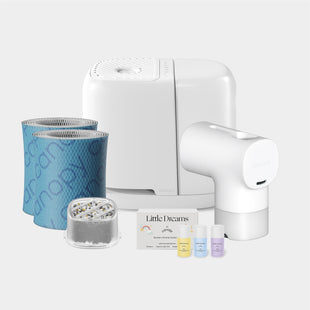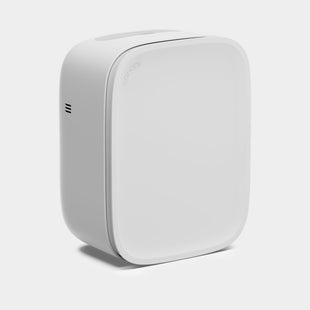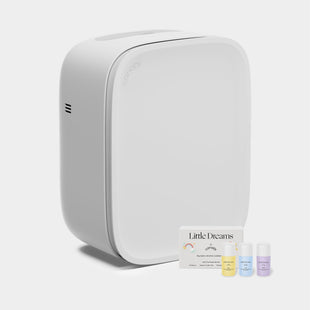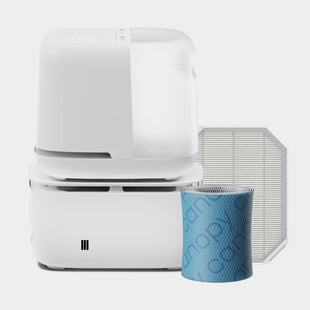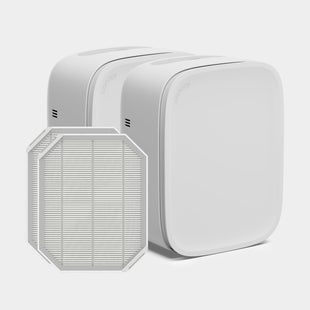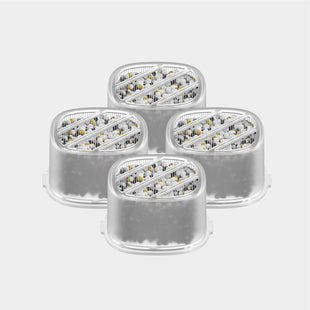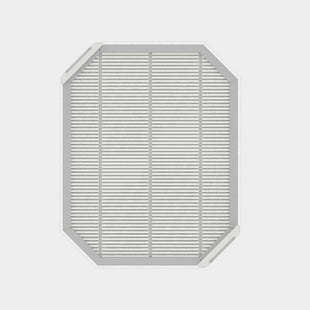Have you ever found yourself wondering: why does my room smell? Or, maybe you noticed your whole house smells stale or, more specifically, your living room smells musty.
You may find reprieve in knowing that this is a common problem among households; you are not alone in your experience nor are you doing anything “wrong.” Sometimes, smells just happen. In this blog post, we will discuss potential origins of room smells, common household air pollutants and their accompanying health hazards, how to get rid of bedroom odor immediately, and how to take proactive steps to prevent future smells.
Why Does My Room Smell?
“Why does my room smell?”
“Where the heck is that smell coming from?”
“Am I going crazy?”
You may have taunted yourself with internal dialogue along these lines over the course of your home tenure. Whether your house smells stale or a specific room smells musty, there is inevitably an origin to that smell. What are the potential causes of home smells? There are many possibilities, and our list is not exhaustive.
Mold or Mildew
Microbial volatile organic compounds (mVOC) are a byproduct of mold growth in your home and may be the reason why your room smells musty. Mold can be found in many areas of your home, especially in dark, damp places like under your sink, in the crevices of your bath or shower, and near your toilet.
Stagnant Air
Unless you open your windows daily, stagnant home air may be a problem. Stagnant air or home air that is inefficiently ventilated is the reason why your house smells stale. Why? Stagnant air traps dust (which is composed of dead skin, pollen, pet dander, and insect droppings), dirt, mold spores, or secondhand smoke that enters your home from your clothes or shoes.
Dirty Laundry
Dirty laundry can be the leading reason why your room smells musty, especially if your laundry basket is filled with soiled workout clothes, damp cloths, or any other damp piece of fabric. A study conducted by the Journal of Chromatography found 6 toxic volatile organic compounds from just one piece of soiled clothing; imagine a whole basket full of soiled clothes!
Clogged Drain
A clogged drain can cause a serious case of home odor if left unaddressed. The kitchen sink, more specifically the garbage disposal, and the shower drain are the most common culprits of unbearable odor.
Stains
Pet accidents, food and drink spills, and empty food containers can build up a heck of a lot of bacteria, which can cause foul smells in your home.
Warning!
If you smell burning rubber or rotten eggs in your home, this is cause for concern.
A rotten egg smell could indicate a natural gas leak. Get everyone out of your home and open all of your windows so that the gas can escape your home. Call your gas company immediately to report the problem.
A burning rubber smell could be a dangerous electrical issue in which the wires from an appliance are overheating. If the electrical issue is not immediately identified, call an electrician immediately.
Household Air Pollutants
While some household air pollutants have an accompanying odor and may explain why your room smells musty, other household air pollutants are odorless and can contribute to low indoor air quality and subsequent health conditions if not quickly addressed.
The most common air pollutants that can be found in the home are: biological pollutants, formaldehyde, indoor particulate matter, volatile organic compounds, secondhand smoke, and carbon monoxide.
Biological Pollutants
Biological pollutants include pet dander, pollen, mold, pest droppings, insect parts, bacteria, and viruses. When your house smells stale, it can be the result of an accumulation of biological pollutants that appear to you as dust on surfaces, floors, and hidden nooks and crannies.
Formaldehyde
Formaldehyde is a toxic, odorless gas that smells like pickles. Many things can release formaldehyde into your home including: resins from wood products, glue, paint and lacquers, paper products, as a preservative in certain beauty and consumer products, and in certain fertilizers.
Indoor Particulate Matter
Indoor Particulate Matter (PM) refers to particles, whether solid or liquid, that remain suspended in the air. When PM is higher than 10 micrometers, the particles can be inhaled through the nose or mouth and cause serious damage to your internal organs. Stoves, heaters, fireplaces, and smoke are the most common sources of PM.
Volatile Organic Compounds (VOC)
Volatile Organic Compounds (VOCs) refer to gases that escape from a specific set of solid or liquid products. Wood preservatives, aerosols, disinfectants, air fresheners, dry cleaned clothing, and more regular household products can infiltrate your home air quality and interfere with your health.
Secondhand Smoke

Whether you smoke, someone in your household smokes, or you are around someone who smokes, secondhand smoke can enter your home and settle on surfaces. Secondhand smoke is considered a Group A carcinogen and contains over 7,000 substances. Yikes! If you were recently exposed to smoke whether intentional or intentional, secondhand smoke may be the reason why your house smells stale since this air pollutant settles on clothes and transfers to surfaces around your home.
Carbon Monoxide
While carbon monoxide is a clear, odorless gas, it is gravely toxic and lethal in high concentrations. Most states require carbon monoxide detectors in homes or private dwellings, which ensures maximum safety for you, your family, and with whom you share a space. Gas or space heaters, backdraft from appliances, gas stoves, car exhaust, and tobacco smoke are the leading sources of carbon monoxide.
The Effects of Household Air Pollutants
Household air pollutants, if left unaddressed, can lead to a myriad of health problems and even death. According to the World Health Organization (WHO), nearly 4 million people per year die from illnesses as a result of exposure to household air pollutants.
Household air pollutants, in fatal doses, can cause: stroke, heart disease, lung cancer, and chronic obstructive pulmonary disease (COPD). In addition, for children under the age of 5, half of the deaths due to pneumonia are a result of inhaled indoor particulate matter.
Whether you can or cannot see the household air pollutants, smell them or go about your day with no knowledge of their presence, household air pollutants can wreak havoc on your house and your health.
How to Mitigate Bedroom Odor
Now that you have an answer to the question: “Why does my room smell?” You now need to know how to get rid of bedroom odor in your home. So, where do you start? First and foremost, you need to figure out the source of the odor, which will allow you to find an effective solution moving forward.
Figure Out the Odor Source
The easy, albeit not always entirely effective, solution to a foul odor in your home is to burn a handle or douse all of your furniture in Febreze. Unfortunately, this tactic is only a temporary solution and will not address the heart of the issue.
When trying to figure out how to get rid of bedroom odor, you need to follow your nose. As a bloodhound would do, go from room to room and identify where the smell is most prominent. Follow the scent until you find the source. Maybe one of your vents or a particular area of your carpet has a foul odor, your laundry basket is filled with wet clothing, or your shower drain or kitchen sink disposal smells of rotten food or buildup. Regardless of where your nose takes you, identifying the odor source will make a long-term solution more likely.
Deep Clean Your Home

Deep cleaning your home may seem like a daunting task. In all honesty, the first time you deep clean your home, it is quite the undertaking. However, regular maintenance on a weekly or monthly basis can make the cleaning process less extensive and prevent foul odors from infiltrating your home.
Dusting your home from top to bottom is a key tactic in cases when your house smells stale. Dust can accumulate over time to create a persistent, stale smell that is relatively unpleasant. Once you have completed dusting, cleaning your floors (whether you have hardwood, laminate, or tile flooring or carpet) is key to keeping a fresh smelling home.
Manual Ventilation
The air in your home can become stale and highly polluted without proper ventilation. Air conditioners during the summer months and central heating in the winter only recycles low quality air throughout your home creating a hotbox of pollutants. If only for 5 minutes per day in the morning or before bed when the air is typically cooler, opening your windows for manual ventilation can dramatically improve the quality of your home air.
Laundry Day
Yeah, yeah, laundry is a real pain. You would be hard pressed to find someone who truly enjoys laundry day. However, keeping up with a weekly laundry schedule can dramatically improve the air quality of your home. If your room smells musty, especially if the bedroom where you keep your laundry smells musty, it can generally be attributed to a smelly laundry basket.
Clothes are not the only item to keep on a laundry schedule. Linens, curtains, upholstery all need a regular wash to keep dust accumulation at bay.
Diffuse Air Purifying Essential Oils
Once you have pinpointed and addressed the source of the odor, you are ready to introduce a safe air deodorizer. Essential oils are a safe and natural way to both deodorize your home and reap the ample benefits of aromatherapy.
Many essential oils have anti-bacterial and anti-carcinogenic properties in addition to their natural aromatherapy benefits. In fact, according to a study conducted by researchers of the Molecular Medicine Report, essential oils can inhibit airborne bacteria colony growth dramatically. When determining how to get rid of bedroom odor, using essential oils like peppermint, lemon, eucalyptus, tea tree, and basil can be most effective.

Canopy Diffuser is the newest addition to the Canopy family providing an entirely different diffusion experience. Canopy Diffuser is a no mist, no water diffuser, allowing the maximum antibacterial and aromatic benefits of your essential oils. For short term diffusion, you can use the Canopy Diffuser Aroma Puck, which you can place directly on top of the Canopy Diffuser for a quick deodorizer. If your house smells stale or your whole room smells musty, you can utilize the Canopy Diffuser Diffusion Well, which is compatible with Canopy essential oil blends or your favorite essential oil blend.
Happy diffusing!









